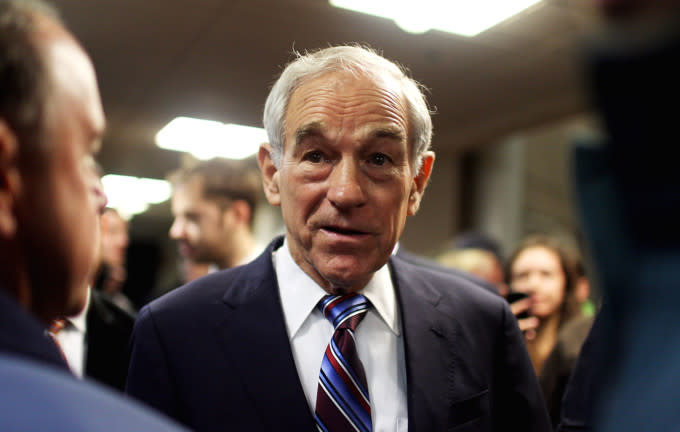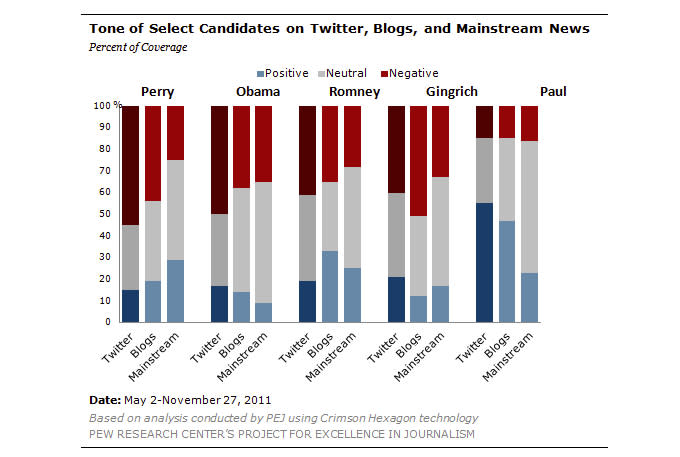 The Cutline
The CutlineIf the 2012 election were decided on Twitter, Ron Paul would be our next president
Ron Paul would win the Republican nomination by a landslide and unseat Barack Obama to become the 45th President of the United States--if the 2012 presidential race were held on Twitter.
That's according to a new study by the Pew Research Center's Project for Excellence in Journalism, which examined more than 20 million tweets about the 2012 campaign published between May 2 and November 27.
Paul "has enjoyed the most favorable tone on Twitter of all candidates examined," the study found. Since May, more than half (55 percent) of tweets about the Republican hopeful have been positive--the highest percentage of any candidate in the GOP field. And just 15 percent of tweets about Paul have been negative--the lowest percentage of any candidate.
Compare that treatment to, say, Newt Gingrich, who has been subject to more negative tweets (40 percent) than positive (21 percent) by nearly a 2-to-1 margin. However, the study noted, Gingrich has seen his positive tweet stock rise in recent weeks, an effect (and, perhaps in part, cause) of the former House speaker's rise in the polls.
President Barack Obama--who, in terms of sheer volume, is the most talked about 2012 candidate on social media platforms--has been pummeled on Twitter. More than half (51 percent) the tweets about Obama have been negative, while just 17 percent have been positive, according to the study. Still, Obama's "most sharply negative assessment has come from the news media, not social media."
Herman Cain--who for months had enjoyed Ron Paul-like positivity on Twitter--suffered a deluge of negative tweets, which began even before the allegations about his sexual misconduct surfaced:
In news coverage, the most covered candidate in the last seven weeks was Herman Cain, and that heavy attention was not favorable. Before he suspended his campaign, Cain suffered six straight weeks in which negative assertions in the news outnumbered positive ones--a period of scrutiny that began before allegations about sexual misconduct surfaced and came after nine weeks of positive coverage from August through mid-October. Thus Cain's candidacy involved three distinct periods in news coverage: limited attention for two and a half months, a period of rising coverage for three months, and six weeks of intensifying and ultimately decisive scrutiny.
Some other, more general findings from the study:
• "One distinguishing factor about the campaign discourse on Twitter is that it is more intensely opinionated, and less neutral, than in both blogs and news. Tweets contain a smaller percentage of statements about candidates that are simply factual in nature without reflecting positively or negatively on a candidate. In general, that means the discourse on Twitter about the candidates has also been more negative."
• For most candidates, "the percentage of neutral statements was markedly smaller on Twitter than in blogs and much smaller than in the news coverage, where neutral assessments comprised the largest component of each candidate's coverage."
• One reason that coverage of candidates on Twitter appears more opinionated than other forms of media is a function of brevity: "Capped at 140 characters, there isn't much room for qualification and nuance. Another is the ease with which a provocative statement can be passed on. One tweet can be amplified and multiplied many times over by having Twitter users retweet the original message."
Click here for Pew's full report, "Twitter and the Campaign."
Other popular Yahoo! News stories:
• Stephen Colbert loses bid for naming rights to South Carolina primary
• Majority of Americans think we celebrate the holidays too early
• The 40 most-shared articles on Facebook in 2011



